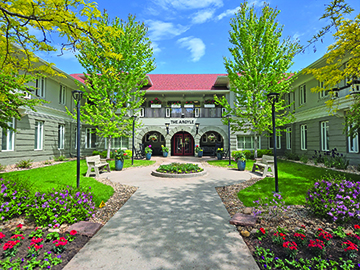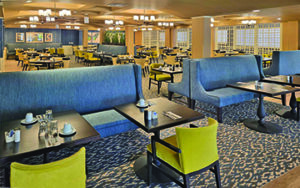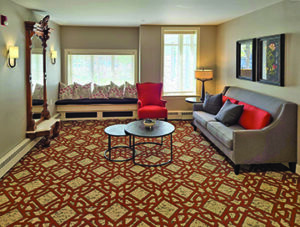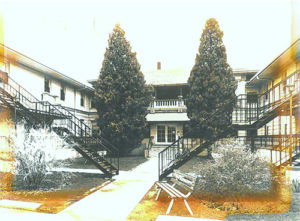by Jessica Hughes
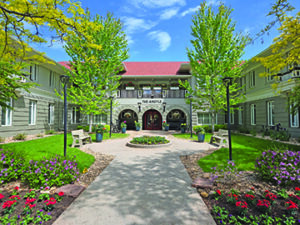 With the rising cost of living and the grip of inflation on monthly budgets, coupled with the potential loss of Social Security, affording retirement is becoming an increasingly distant prospect for aging Baby Boomers and Millennials alike. Compounding this challenge is the continued escalation in the cost of assisted living facilities, and the dwindling number of such facilities accepting Medicaid. This combination makes finding a quality, yet affordable, assisted living facility for seniors an ever-growing challenge, underscoring the immense value and significance of places like The Argyle in Denver.
With the rising cost of living and the grip of inflation on monthly budgets, coupled with the potential loss of Social Security, affording retirement is becoming an increasingly distant prospect for aging Baby Boomers and Millennials alike. Compounding this challenge is the continued escalation in the cost of assisted living facilities, and the dwindling number of such facilities accepting Medicaid. This combination makes finding a quality, yet affordable, assisted living facility for seniors an ever-growing challenge, underscoring the immense value and significance of places like The Argyle in Denver.
The Argyle is a well-known non-profit senior living facility in Denver that works to provide affordable, high-quality living accommodations and services to low- and moderate-income seniors in Denver. This long-time legend in senior assisted living just celebrated its 150th anniversary last month.
Coinciding with this historic occasion, the facility unveiled its latest renovations, a promising indicator that it will continue serving the community for years to come. With an unprecedented demand for assisted living care on the horizon — statistics suggest that 7 out of 10 individuals will require such services in their lifetime — and projections estimating an additional one million beds will be needed by 2040 to accommodate the growing elderly population, establishments like The Argyle take on heightened significance in meeting the escalating need for quality care.
Over the years, the Argyle has maintained its non-profit status, which Executive Director of the Argyle, Tom Carlson, explains is why they can offer affordable, high-quality living accommodations and services to its seniors.
“We are a non-profit. We don’t have a large corporation or investment company that we need to make large payments to every month like most other Senior living communities do. We have been in this location since 1900 and to my knowledge, we don’t have a mortgage,” says Carlson. “We have a board of nine members who are non-paid volunteers, some of which are in the accounting field. They oversee us to make sure we are being good stewards of our money.”
As a non-profit senior living facility, the Argyle offers high-quality care for lower to moderate-income seniors at an affordable monthly rate. Current monthly costs for assisted living residents of The Argyle start at $2,800, while the median cost of a private, single-bedroom unit in an assisted living facility in the U.S. is $4,803 per month.
“A non-profit is not sending money to an investment company or a large corporation. Non-profits are just that, non-profits; they have to use their money by putting it back into the community, their staff, or their residents,” says Carlson. “As a result, non-profits usually pay their staff higher, ensuring they have better more qualified staff resulting in, my opinion, better care.”
The facility’s mission to offer quality care for moderate-income seniors is a “tradition” that extends back to its original roots in 1874 when two women, Mrs. Ann Figg and Mrs. Vincent, met with their friends at Trinity Methodist Church in Denver to address the growing homeless population, affecting mostly women. They came together to create an inclusive retirement community that felt like home, regardless of financial circumstances. So, in 1875, The Old Ladies Home opened its doors to elderly women in Denver.
“In the 1870s, this was a very revolutionary idea. Things were very different then and women were not given the same opportunities as men, especially older women. And the thought of caring for seniors who are not your loved ones during that time was unheard of,” says Carlson. “They saw a need and brought it to the community to help this underserved population.”
By 1900, the facility relocated to its current location in the Berkeley/Highlands neighborhood, inspiring its name change to the Argyle. Beyond its name change, the Argyle evolved into assisted living for all seniors in need, not just women.
“In 1984 we started letting men live here,” says Carlson. “We have also reached out to our other underserved populations including the black community, the Hispanic community, and the LGBTQ community to let them all know they are welcome here and will be treated with dignity and respect while keeping our core mission of serving seniors.”
In 1988, the original building was demolished and in 1990, a new building was constructed to enhance the quality of the facility while providing more rooms for residents. Carlson explains the much-needed renovations kept the old-world charm but gave the facility a fresh look. The historic front facade was saved, returning the building to its original design, and more than 200 pieces of furniture and artwork were restored.
Beyond its restored aesthetics, the Argyle offers a wellness center with trained physical therapists on staff who create a personal one-on-one training session for each resident who wants one. “This is free to all, no insurance is billed. This is just one example of the many benefits of The Argyle,” says Carlson. “We have many activities and outings, including Rockies games and shows at the Buell Theater.”
But for aging Baby Boomers and Millennials, the cost for high-quality assisted living will have to come down to affordable retirement in facilities similar to the Argyle. “I see the Baby Boomers and Millennials wanting to move to senior communities when they are at the right age. Maintenance-free lifestyle, someone to make your meals, do your laundry and have a full activities calendar of things to do with your peers,” says Carlson. “The issue is going to be the cost. It is said that the boomers have far less in savings at this stage in their life than the prior generation and with millennials, the verdict is still out if they will be able to afford senior living.”
Photos provided by The Argyle

